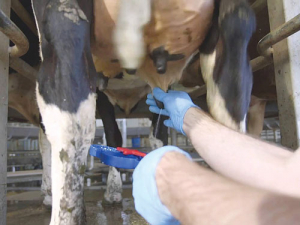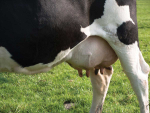Cows with healthy udders have less mastitis, produce more and are easier to milk.
Keeping teat ends healthy, using milking equipment that is operating well, and disinfecting teats after milking helps minimise the spread of contagious mastitis bacteria.
Contagious mastitis is usually spread during milking. Milk from an infected quarter can be spread to the teat skin of other quarters and cows by dirty hands or gloves, teat cup liners, and cross flow of milk between teat cups. Hygienic practices at milking time help reduce this type of mastitis.
Regular, systematic checks of equipment will also help maximise milking efficiency and prevent mastitis.
Milking machine equipment is designed to harvest milk efficiently and maintain healthy teats. Machines that are not functioning correctly can contribute to new mastitis infections by damaging teat ends, forcing bacteria-laden droplets into the teat canal, and reducing full udder milk-out.
Problems are often due to inadequate maintenance of mechanical components and rubberware.
Milking machine equipment has been designed to harvest milk efficiently and maintain healthy teats.
Teats are attached to milking machines for 50-100 hours per lactation.
Machines that are not functioning correctly can contribute to new mastitis infections by:
Spreading bacteria from teat to teat and from cow to cow
Damaging the teat ends and natural defence mechanisms of the teat canal
Causing impact of bacteria-laden droplets into the teat canal, especially towards the end of milking
Reducing the degree or frequency of full udder milk-out.
The most common reason for milking machine problems is inadequate routine maintenance of mechanical components and rubberware.
A series of regular, systematic checks gives a simple method of finding problems and guiding preventative maintenance. If more than one person milks in your dairy, it is important to assign these checks to particular people, and ensure that the right person is alerted to any problems that are found or suspected.
Daily and weekly checks should be conducted by milking staff as part of their regular list of responsibilities.
Monthly checks should be done by the herd owner or manager or other skilled observer.
Recording the results of monthly checks enables subtle changes due to wear and age to be detected more easily.
Teat disinfection is the most effective mastitis control measure, but only works if done properly.
Failure to cover the whole teat of every cow at every milking or using incorrectly diluted teat sprays are the most common errors.
Bacteria in milk from infected quarters can contaminate the skin of many other teats during milking. After milking, these bacteria multiply on the teat skin and may enter the teat canal.
Disinfecting the teat surface immediately after milking helps minimise the spread of bacteria.
Bacteria in milk from infected quarters may contaminate the skin of many other teats during milking. For example, after a liner has milked an infected quarter, bacteria may be transferred to the next 5-6 cows milked with that cup.
After milking, bacteria multiply on the teat skin and may extend into the teat canal. If the whole surface of each teat is disinfected immediately after milking, this spread can be minimised.
Teat disinfection also helps to keep teat skin supple and healthy. Teat disinfection after milking reduces new infections due to cow associated bacteria such as Staph. aureus by 50% and is also important in reducing Strep. uberis infections.
It is one of the most effective cell count and mastitis control measures available, but it only works if it is done thoroughly.
Teat disinfectants must be diluted to the correct concentration for use. The active ingredients often lose their disinfectant ability with time after mixing, and if you include additives to improve skin condition (emollients) these may reduce disinfectant activity.
Any contamination with milk and other organic material also reduces activity. Correct mixing each day is best to get maximum performance. Some emollients are not suitable for use with particular disinfectants. Failure to cover the whole teat of every cow at every milking and poorly diluted teat sprays are the most common errors in teat disinfection.











